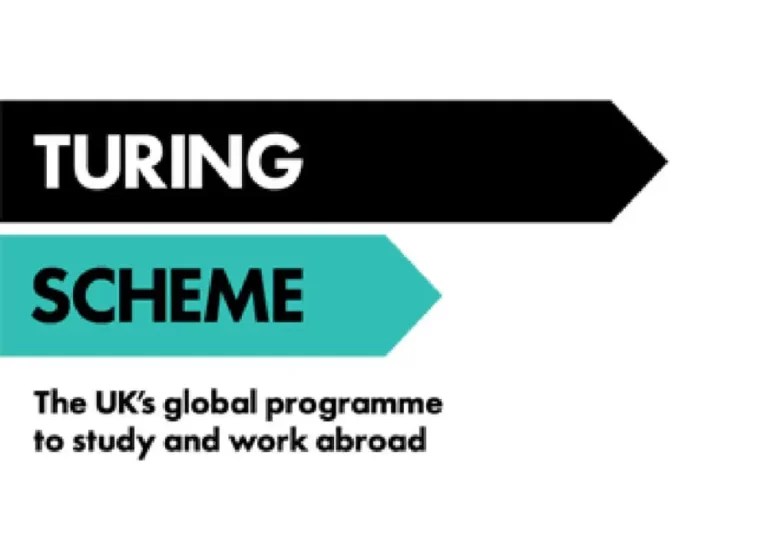What’s the Turing Scheme?
The Turing Scheme is the UK’s global alternative to the Erasmus programme, created in 2021 after the UK left the European Union. While Erasmus focused on European exchange, the Turing Scheme opens new doors worldwide. Named after Alan Turing, this £110 million initiative helps UK and British overseas students access study and work placements across the globe.
Students cannot apply directly—they must be enrolled in an eligible school, college, or university that submits a funding application.
Grants help cover living costs and aim to boost skills, confidence, and career prospects.
The scheme runs in annual cycles and includes extra support for under-represented students. It marks a bold step in continuing the UK’s commitment to international education.
Turing Scheme Eligibility Explained
For Students
Students cannot apply for the Turing Scheme directly. To be eligible, you must be enrolled in an education or training provider based in the UK or a British overseas territory that has successfully applied for Turing funding.
You don’t need to be a UK citizen, but you must be receiving your education from an eligible provider or be part of a consortium-led activity.
If you’re interested in studying or working abroad through the scheme, contact your school, college, or university to check if they are participating.
For Providers and Consortiums
Schools, Further Education (FE), and Higher Education (HE) providers can apply for Turing Scheme funding if they are registered in the UK or a British overseas territory and directly educate or train the students involved.
Applicants must be financially viable and capable of managing public funds responsibly. FE and school providers may also form consortiums with others in their sector, with one organisation acting as the lead.
Funds cannot be used for activities linked to Confucius Institutes.
Financial Checks and Due Diligence Requirements
To receive Turing Scheme funding, all providers must meet financial and governance standards set by the UK government. This ensures that public money is used responsibly and funding is delivered effectively. Applicants must:
- Be financially viable and demonstrate the ability to manage grant funds
- Follow HM Treasury guidance on managing public money
- Comply with the Government Functional Standard for grants
- Submit any requested financial or governance documentation
- Pass due diligence checks before funding is approved
These checks help ensure that providers can successfully deliver placements and support students abroad throughout the project cycle.
Purpose and aims of the Turing Scheme
The Turing Scheme was created to expand global opportunities for UK students and learners, replacing the Erasmus+ programme. It aims to make study and work abroad more accessible, especially for under-represented groups. Key objectives include:
- Providing life-changing international experiences
- Helping students develop skills valued by employers
- Increasing access to global mobility for disadvantaged learners
- Supporting UK education providers in building international partnerships
- Enhancing the UK’s global presence in education and training
The scheme focuses on creating lasting academic, professional, and cultural benefits for participants while promoting fairness and inclusion.

What Can Turing Scheme Funding Be Used For?
Turing Scheme funding is designed to support international study and work placements that enhance learning and employability. Education providers can use the grant to:
- Fund student placements abroad for study or work experience
- Help cover students’ cost of living during placements
- Support travel expenses, especially for disadvantaged participants
- Provide additional funding for students with special educational needs or disabilities (SEND)
- Deliver the administrative work needed to run the placements
Funding must be used within the project cycle dates and cannot support activities outside the scheme’s scope or ineligible institutions.

How Much Is the Turing Scheme Grant?
Turing Scheme grants vary based on destination and placement length. The funding helps cover living costs, with additional support for disadvantaged students and those with special needs. Example rates include:
- £120 per week for placements of 4–8 weeks
- £335 per month for placements over 8 weeks
- Up to £147.50 extra per month for disadvantaged students (4–8 weeks)
- Up to £445 extra per month for disadvantaged students (8+ weeks)
- Travel cost support based on distance
- 100% funding for SEND-related support, including risk assessments
These grants are partial contributions and not intended to cover all expenses abroad. These rates are for cost of living support and depend on host country categories (low/medium/high cost). Additional travel grants are based on distance bands – exact figures change yearly.
How to Apply for Turing Scheme Funding
Education providers and consortiums can follow these steps to apply:
- Check Eligibility: Ensure you’re a UK or British overseas provider delivering education or training.
- Review Guidance: Read the official Turing Scheme guidelines and deadlines.
- Plan Your Project: Define placements, destinations, and support for students.
- Register Online: Create an account on the Turing Scheme application portal.
- Complete the Form: Fill in details about your project, partners, and budgets.
- Submit Financial Info: Provide documents to verify your financial viability.
- Apply on Time: Submit everything before the official deadline.
- Wait for Results: Applications are reviewed independently. You’ll be notified if successful.
Documents Required for Turing Scheme UK / Non-UK
To apply for Turing Scheme funding, providers must submit supporting documents that confirm their eligibility, financial health, and delivery capacity. These may include:
- Proof of registration: Confirmation that the organisation is based in the UK or a British overseas territory
- Financial statements: Recent audited or independently reviewed accounts
- Bank details: For grant payment processing
- Governing documents: Such as articles of association or equivalent
- Consortium agreement (if applicable): Outlining roles and responsibilities of all members
- Project plan and budget: Detailing placements, destinations, and costs
Additional documents may be requested during due diligence checks, depending on your organisation’s status.
What Are the Turing Scheme Assessment Criteria?
Turing Scheme applications are assessed to ensure funding is allocated fairly and effectively. Key assessment criteria include:
- Project quality: Clear objectives, planning, and alignment with scheme goals
- Impact and outcomes: Benefits for students, especially disadvantaged groups
- Value for money: Efficient use of funding with strong justification of costs
- Delivery capacity: Ability to manage placements and support students
- Inclusion and accessibility: Plans to support a diverse student population
- Partnership strength: Quality and relevance of international partners
Each application is scored based on these criteria, and funding is awarded to the highest-scoring eligible projects.
What Happens If Your Application Is Approved?
If your Turing Scheme application is approved, you’ll receive a grant offer letter outlining the funding awarded and project terms. Your organisation must accept the offer and follow the instructions for setting up your grant agreement.
Once the agreement is signed, funds will be transferred according to the project timeline. You’ll be responsible for managing the placements, distributing grants to students, and meeting reporting and compliance requirements.
This includes tracking outcomes, spending, and submitting progress reports. Regular communication with the Turing Scheme delivery team may also be required to ensure smooth delivery and accountability throughout the funding cycle.
When will I find out if my Turing grant application was successful?
After submitting your Turing Scheme application, it will be reviewed and scored by an independent assessment team. You’ll typically be notified of the outcome during the summer or early autumn, depending on the academic cycle. If your application is successful, you’ll receive a grant offer letter with funding details and next steps. Make sure your contact details are up to date and check emails regularly during this period. Timelines may vary slightly each year, so always refer to the official guidance for the specific announcement dates.
How and when will I receive my Turing grant payment?
If your institution’s application is successful, grant payments are made directly to the provider—not individual students. The provider is responsible for distributing funds to eligible students. Payments are usually made in phases:
- Initial payment after the grant agreement is signed
- Further payments based on reporting milestones and placement progress
- Final payment after all reporting and compliance checks are complete
Students should check with their provider for the exact timeline, as each institution may handle distribution slightly differently. Make sure your provider has your correct bank details and any required documentation to avoid delays.
How to Make an Appeal or Complaint
If you disagree with the outcome of your Turing Scheme application or have concerns about the process, you can submit an appeal or complaint. Here’s how:
- Appeals: Must relate to how your application was assessed, not the score itself. Submit within the specified timeframe, clearly stating the reason.
- Complaints: Can be made about service quality, process issues, or delays. Follow the official complaints procedure on the Turing Scheme website.
- Supporting documents: Include any relevant evidence to support your case.
- Response time: You’ll usually receive an acknowledgement quickly, with a full response provided after a formal review.
Always check the latest guidance to ensure your appeal or complaint meets all requirements.
FAQs about the Turing Scheme
Can Startups or Employers Get Involved?
Yes, startups and employers can take part in the Turing Scheme by hosting students for work placements. While they cannot apply for funding directly, they play a vital role by partnering with UK education providers (universities, colleges, or schools) that have received Turing funding.
By offering internships or short-term placements, businesses benefit from:
- Access to skilled, motivated students from across the UK
- Short-term support for projects or operations
- Opportunities to build long-term recruitment pipelines
If you’re a startup or company interested in hosting a student, contact nearby universities or colleges to explore partnership opportunities. Make sure the placement aligns with the project cycle and learning objectives set by the provider.
Can international fee-paying or non-UK citizens apply for Turing funding?
Yes. You don’t need to be a UK citizen, but you must be studying at an eligible UK or British overseas institution.
What is the Turing travel grant for under-represented students?
It’s additional funding to help with travel costs based on the round-trip distance, available to disadvantaged or under-represented students.
Is there extra support for under-represented or widening participation students?
Yes. Eligible students may receive higher grant rates and travel support to ensure equal access to placements.
Can final-year students join departmental Turing activities?
Yes, if nominated by their department or taking part in approved programmes like global internships.
What’s the minimum or maximum placement duration to qualify?
Placements must be at least 4 weeks long. Maximum durations depend on your institution’s plans and project cycle limits.
Which countries are eligible for Turing placements?
The scheme supports placements worldwide, not just in Europe.
Destinations must meet the programme’s safety and quality standards.
Will I need a visa for my placement?
Possibly. Visa requirements depend on the host country and length of stay. Your provider will advise on this or you can also checkout theInterna visa services.
What are the Turing Scheme cost of living group categories?
Countries are grouped by cost of living to set grant rates. Higher-cost countries offer larger grants.
Does the Turing Scheme cover tuition fees?
No. The grant is designed to help with living and travel expenses, not tuition. Check with your host institution about tuition costs.
What’s the timeline for Turing grant payments?
Payments are made to institutions, which then distribute funds to students. Timelines vary by provider and placement start date.
How will I get confirmation of my grant payment?
Your provider will notify you once your funding is approved and when payments will be issued. Always check with them directly.
Can I do two Turing placements during my year abroad?
Yes, if both placements are approved and fit within the project cycle dates. Speak to your provider for guidance.
What if my circumstances change while I’m abroad?
Notify your provider immediately. They’ll assess how changes affect your funding and placement eligibility.
Can I change my placement dates after I’ve started?
Possibly. Date changes must be discussed with your provider, who will update the Turing Scheme team if needed.
Who do I contact with questions about the Turing Scheme?
Always start by contacting your education provider. They manage your participation and communicate with the Turing Scheme directly.
How Does the Turing Scheme Compare to Erasmus?
The Turing Scheme replaced Erasmus+ in the UK after Brexit. While Erasmus focused mainly on Europe, the Turing Scheme expands global mobility by funding placements worldwide—including Asia, Africa, and the Americas. Unlike Erasmus, students apply through their institution, not a central EU body. The Turing Scheme also places a stronger emphasis on supporting under-represented and disadvantaged students.
Links Related to Turing Scheme
- Pre-Internship Training Course
- What is the Turing Scheme and how does it work?
- Can I work during my Erasmus year?
- How to decide whether to study a new subject on your Erasmus year
- A Guide to Making the Most of Your Erasmus Experience
- 5 Tips for Building a Strong Personal Brand During Your Internship
- Interning at a Startup: 5 Pros and Cons
- Erasmus Internships
- How to Get Spain Study Visa
- What are Pre-Placement Offers (PPO)?
- What are internships / intern jobs?
- What is a Placement Year?

